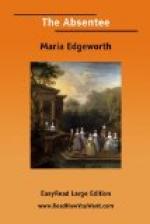He heard terrible reports of the mischief they had done in families; the extravagance into which they had led men; the imprudence, to say no worse, into which they had betrayed women. Matches broken off, reputations ruined, husbands alienated from their wives, and wives made jealous of their husbands. But in some of these stories he discovered exaggeration so flagrant as to make him doubt the whole; in others, it could not be positively determined whether the mother or daughter had been the person most to blame.
Lord Colambre always followed the charitable rule of believing only half what the world says, and here he thought it fair to believe which half he pleased. He further observed, that, though all joined in abusing these ladies in their absence, when present they seemed universally admired. Though everybody cried ‘Shame!’ and ‘shocking!’ yet everybody visited them. No parties so crowded as Lady Dashfort’s; no party deemed pleasant or fashionable where Lady Dashfort or Lady Isabel was not. The bon-mots of the mother were everywhere repeated; the dress and air of the daughter everywhere imitated. Yet Lord Colambre could not help being surprised at their popularity in Dublin, because, independently of all moral objections, there were causes of a different sort, sufficient, he thought, to prevent Lady Dashfort from being liked by the Irish; indeed by any society. She in general affected to be ill-bred, and inattentive to the feelings and opinions of others; careless whom she offended by her wit or by her decided tone. There are some persons in so high a region of fashion, that they imagine themselves above the thunder of vulgar censure. Lady Dashfort felt herself in this exalted situation, and fancied she might ‘hear the innocuous thunder roll below.’ Her rank was so high that none could dare to call her vulgar; what would have been gross in any one of meaner note, in her was freedom, or originality, or Lady Dashfort’s way. It was Lady Dashfort’s pleasure and pride to show her power in perverting the public taste. She often said to those English companions with whom she was intimate, ’Now see what follies I can lead these fools into. Hear the nonsense I can make them repeat as wit.’ Upon some occasion, one of her friends ventured to fear that something she had said was too strong. ’Too strong, was it? Well, I like to be strong—woe be to the weak.’ On another occasion she was told that certain visitors had seen her ladyship yawning. ’Yawn, did I?—glad of it—the yawn sent them away, or I should have snored;—rude, was I? they won’t complain. To say I was rude to them would be to say, that I did not think it worth my while to be otherwise. Barbarians! are not we the civilised English, come to teach them manners and fashions? Whoever does not conform, and swear allegiance too, we shall keep out of the English pale.’
Lady Dashfort forced her way, and she set the fashion: fashion, which converts the ugliest dress into what is beautiful and charming, governs the public mode in morals and in manners; and thus, when great talents and high rank combine, they can debase or elevate the public taste.




